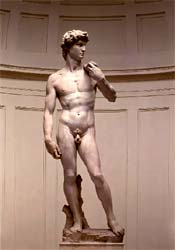David's early life

Michelangelo's DavidHis early occupation was that of tending his father's sheep on the uplands of Judah. From what we know of his later story, doubtless he frequently spent his time, when watching sheep, with his shepherd's musical instruments (flute and harp), while he drank in the many lessons taught him by the varied scenes spread around him. His first recorded exploits were his encounters with the wild beasts. He mentions that with his own unaided hand he slew a lion and also a bear, when they came out against his flock, beating them to death, in open conflict, with his club (1 Samuel 17:34,35).
While David was thus engaged with his flocks, Samuel paid an unexpected visit to Bethlehem. There he offered up sacrifice, and called the elders of Israel and Jesse's family to the sacrificial meal. Among all who appeared before him he failed to discover the one he sought. David was sent for, and the prophet immediately recognized him as the chosen of God, chosen to succeed King Saul, who was now departing from the ways of God, on the throne of the kingdom. He accordingly poured on his head the anointing oil. David went back again to his shepherd life, but "the Spirit of the Lord came upon David from that day forward," and "the Spirit of the Lord departed from Saul" (1 Sam. 16:13, 14).
Not long after this David was sent for to soothe with his harp the troubled spirit of King Saul, who suffered from a strange melancholy dejection. He played his harp before the king so skillfully that Saul was greatly cheered, and began to entertain great affection for the young shepherd. After this he went home to Bethlehem. But he soon again came into prominence. The armies of the Philistines and of Israel were in battle array in the valley of Elah, some 16 miles south-west of Bethlehem; and David was sent by his father with provisions for his three brothers, who were then fighting on the side of the king. On his arrival in the camp of Israel, David, now a youth (1Sam17:42), was made aware of the state of matters when the champion of the Philistines, Goliath of Gath, came forth to defy Israel. David took only his sling, and with a well-trained aim threw a stone "out of the brook," which struck the giant's forehead, so that he fell senseless to the ground. David then ran to cut off Goliath's head with Goliath's own sword (1 Sam. 17). The result was a great victory for the Israelites, who pursued the Philistines to the gates of Gath and Ekron. However, 2 Samuel credits Elhanan with Goliath's death. See Goliath.
David's popularity following this heroic exploit awakened Saul's jealousy (1 Sam. 18:6-16), which he showed in various ways. He conceived a bitter hatred toward him, and by various stratagems sought his death (1 Sam. 18:29). The deep-laid plots of the enraged king, who could not fail to observe that David "prospered exceedingly," all proved futile, and only endeared the young hero the more to the people, and very specially to Jonathan, Saul's son, who shared a deep, lifelong relationship with David that some scholars contend was romantic (see Jonathan and David).
During the period of his persecution by Saul, David lived as an exile and accepted the city of Ziklag as a fief from the Philistine King Achish of Gath (1 Sam 27:2-6). Until Saul's death at Gilboa, David worked as a mercenary general for the Philistines, and may have adopted iron technology (as opposed to bronze) from them at this time.

